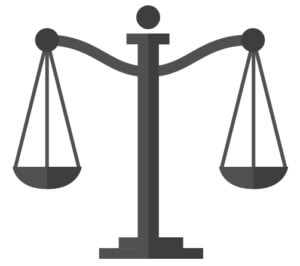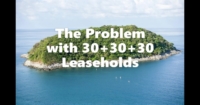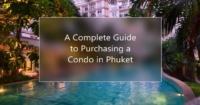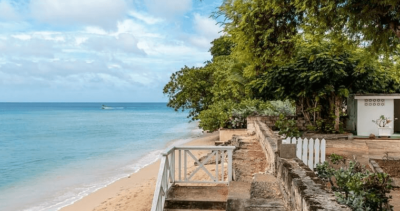SECTION 12: EVOLUTION OF THE PHUKET PROPERTY SECTOR – WHY SO MANY FOREIGNERS OWN VILLAS ILLEGALLY
Legal Transmutation in Phuket
In 2006, thousands of foreigners who thought they owned their Phuket villa, land, house or townhome found out in no uncertain terms that they did not. Everyone knew back then that foreigners were not allowed to own land, but they also “knew” there were easy ways to get around this law.
Set up a Thai Company Ltd. with nominee shareholders – that was the most commonplace solution. A Thai company is not a foreigner, it is a Thai entity, so problem solved . . . right? Wrong.
Foreigners impacted by this advice were remade to pay in one form or another. Either through fresh legal fees to restructure ownership, or through sales at below market prices, it cost people money to extricate themselves from the problems created by an incorrect perception of Thai law. Of course, many were unwittingly misled throughout the entire buying process by professionals who had full knowledge of the illegalities involved.
Every year Phuket welcomes new investors from overseas, and in the last 5-10 years many of these have come from Russia and China. In 2006, not many of Phuket’s tourists came from these two countries; whereas today in 2024 they are still some of the major buyers and investors in Phuket property.
If the authorities continue in earnest with the latest enforcement efforts, it may come as a huge shock to foreigners who own (or thought they owned) land and villas in Phuket, especially those foreigners who are new arrivals.
For the rest of us, it will just be déjà vu.
How Thailand’s Political Regime Changes Affect Phuket Property
As mentioned above, the last two decades have seen multiple changes in the government in Thailand. In fact, it has undergone four major changes since 2006, including two military coups, and seen 12 different prime ministers.
When regimes change, the whole political outlook of a country changes. What had been a focus of enforcement could be put on the back burner as the new government asserts its own priorities. Likewise, previously overlooked transgressions can become the focal point for a new regime.
The degree of disdain for those flouting the law varies from regime to regime. Indeed, the crackdown in 2006 only lasted four months, until a military coup unseated Prime Minister Thaksin, who was spearheading a strict enforcement of land ownership laws.
During that brief four-month window, some Phuket land and villa owners were forced to dissolve companies and sell their land or property. Others escaped punishment once the regime changed. That cooling off period continued through a succession of regime changes up until the present day.
With the daughter of former Prime Minster Thaksin now taking the same leadership role as her father, it is anyone’s guess if they will make this their focus once again in the near future.
Caveat Emptor or Confirmation Bias?
Websites, brochures and flyers have long touted villa ownership in Phuket as easily attainable by setting up a Thai Company. In Phuket alone there are literally hundreds of sales booths, shops and stands, most of which are offering the same solution.
This singular mantra is repeated until it sadly receives an undeserved aura of respectability. Many in the Phuket real estate industry simply tell the buyer what they want to hear, and so the mantra is repeated over and over to potential buyers.
We have already noted how difficult it is to challenge established beliefs. How can someone disbelieve a message (however incorrect) which has been “reinforced” by multiple sources? The industry has even evolved to the extent that villa developments (marketing to foreigners) regularly win respected property awards, adding further positive reinforcement to the narrative. (Occasionally, as reported by Thailand Property News, developers are actually brazen enough to invent an award, simply declaring one their buildings to be “Condo of the Year.”)
Caveat Emptor means “let the buyer beware”. One might think the outlay of hundreds of thousands of Dollars, Euros, Pounds or millions of Renminbi or Roubles would make most buyers more inquisitive. Bizarrely, this is not always the case.
What happens when a new arrival to Phuket reads articles discussing a law firm which has been raided? Or hears a news item about a group of foreigners who have had their day in court, but lost in their attempt to defend a complex ownership structure?
The first thing they do is call the lawyer (or more likely, the accountant) who set up their Thai Company and arranged the purchase of their Phuket villa. When that professional individual is either willing to obfuscate the facts, or is ignorant of the facts, then the foreign owner is often left feeling bullet proof.
Every story they hear about illegal ownership of land or villas then becomes wrong in their eyes, and every other foreigner they meet who buys a property in Phuket through a Thai company with nominee shareholders perpetuates a false confirmation bias.
Every story they hear about illegal ownership then becomes wrong in their eyes, and every other foreigner they meet who buys a property through a Thai company with nominee shareholders perpetuates a false confirmation bias.
No Frame of Reference for So Many New Buyers of Property in Phuket
Jim Thompson was the American credited with reviving the silk industry in Thailand. He first travelled to Thailand in 1945, and like many who visit the country, ended up spending the rest of his life here. In later years, he designed and constructed a house on the Khlong Saen Saep, which was an architectural marvel in its day, and as a museum remains one of the most popular tourist attractions in Bangkok. At the time, however, he owned it as a freehold. He bought the land and he put a house on it. But just three years after Jim Thompson’s mysterious disappearance, in 1970, foreigners have not been allowed to own land.
Foreign tourists have been flocking to Phuket for decades now, and throughout that time English language newspapers, forums and chat rooms have been cautioning readers for years not to be fooled into illegal property purchases. But many still choose to ignore the warning. While there are also those who are “fresh off the boat” and receiving bad advice, very few English-speakers are completely oblivious to the fact that they cannot own land and villas in Phuket as a foreigner.
Sadly, the same cannot be said for Chinese and Russian tourists/investors. Russians have only been coming to Phuket in large numbers for the last ten plus years, and the significant growth in Chinese tourism happened later than that. Many Russians and Chinese are therefore unaware of the previous efforts to enforce illegal ownership, perhaps because no one has ever bothered to tell them. Having no frame of reference, they are unfortunately more easily misled, and do not know what structures are above board and which are not.
There does not appear to be a comparable social network campaign in either Russian or Mandarin to inform people about the laws regarding foreign land ownership. It is possible that one reason why this information has not reached the Russian or Chinese blogospheres is that those writing online about Phuket Property did not experience the last crackdown, and are not familiar with the letter vs. the spirit of the law. Instead, the buyers – and perhaps the bloggers, too – are relying on the advice of individuals who are either oblivious to the facts, or incentivised not to tell the whole story.

The Legal Culture in Russia and China for Buying Real Estate
We are using Russia and China here as examples, but there are likely many other countries that this applies to, too. The issues impacting Russian and Chinese buyers is more cultural in nature, specifically the culture surrounding the use of lawyers to buy property.
We mentioned above that Thai Property Law is rooted in a cultural attachment to land remaining in Thai hands. What we have learned from speaking with Russians and Chinese in Phuket is that, in their cultures, lawyers are usually not involved when buying or selling a property back home.
In fact, there have been many examples over the last few years of Chinese nationals willing to part with money in China, and without leaving their country, have been handed the keys to a property purchased in Phuket. This has in the past allowed some developers and agents to find a way to sell property all over the island that an experienced lawyer would have likely advised against buying. The fact that conducting due diligence and hiring a lawyer is not commonplace in China means developers can sell condominium units to unsuspecting buyers in the same way cheap and faulty goods can be hawked online.
Some Russian and Chinese individuals could, and have already “come unstuck” with their property transactions in Phuket, simply because they didn’t appreciate the need for using a lawyer.
From 350,000 to 35,000,000
In 1970, when the last treaty allowing foreigners to buy land expired, around 350,000 tourists visited Thailand every year. Today that figure is 35 million, and a large number of those (around one third) visit Phuket each year.
When the tourist numbers were lower, the foreigners buying villas were barely noticeable. The authorities could almost turn a blind eye to the relatively small number of foreigners circumnavigating the laws. In many cases they did, mainly because no one complained.
But as foreign interest in acquiring Phuket property steadily increased, the resentment among Thai nationals grew stronger. Anyone who believes that the government will sit idly by and watch the laws of the Kingdom be openly flouted forever is demonstrating a complete ignorance of the depth of feeling which the Thai people have toward foreigners attempting to buy their land.
The Blind Leading the Blind
As tourist numbers are steadily climbing again after Covid, Phuket is now welcoming new residents from a vast amount of nationalities, and many of these have come here to work. Some of these new arrivals are working in the real estate industry.
When foreigner investors are being told “all is well” with a villa purchased using nominee shareholders, all is clearly not well with the advice they are receiving. Any purchase through a Thai Company must be a trading company, not simply a holding company, in order not to fall afoul of the law.
Those conveying this message to buyers are some of the very same foreigners freshly arrived from overseas. And there is always the possibility that the people teaching them the ropes are not fully aware of the complexities of Thai property law.
In some cases, it truly is “the blind leading the blind,” and we are now at a stage where it is universally accepted by all newcomers that it is fine for foreigners to own land or a pool villa in Phuket. Even after the 2024 raids on accounting and legal firms, most foreigners are still oblivious to the laws they may possibly be breaking.
The laws in Thailand can be complex, and some of them are not easy to understand or comprehend. For example, it is illegal to go out in public if you are not wearing underwear. That is an actual law, but we are not sure how it can be adequately policed.
Property ownership laws, on the other hand, are much clearer, and far easier to enforce.
Bad Luck / Bad Choices
As with any industry, when it comes to law firms, you get what you pay for.
Someone preparing for a camping trip, for example, knows they need weather-proof outerwear because the conditions they face will be unpredictable. When deciding what brand to buy, maybe they take the attitude “weather-proof gear is all the same” and choose the cheapest option. And maybe the week they spent in bed with the flu because their apparel was not truly wind or waterproof could have been avoided by spending a little more money.

Hiring a lawyer in Phuket is a little like that—you need one who can help you weather any storm, and it is usually the more experienced lawyers who can do this.
When Phuket saw an unprecedented boom in tourism, a boom in property sales soon followed. We’ve already discussed the solution that was presented to foreigners who wanted to buy a villa in Phuket (Thai companies with nominee shareholders), and we’ve already made it clear that this violated the law. But the advice was commonplace.
After 2006, most experienced law firms stopped recommending the use of nominee structures. This should be a relief to their clients because for the first time ever, the State Auditors Department, The Land Department, Board of Investment and Department of Business Development, the Crime Suppression Division (CSD) and the Department of Special Investigations (DSI) all appear to be cooperating with one another.
This unique example of multi-agency collaboration will make uncovering illicit land ownership a simple process. But those foreigners who have sought experienced legal advice for their Phuket property purchases should have no concerns for their own Thai companies.
The Changes in Nationalities Buying Phuket Property
The Phuket villas being constructed 20 years ago were, for the most part, being purchased by foreigners with Thai wives. These were predominantly Europeans, North American and Australians and a large proportion of these foreigners living in Phuket at that time had Thai spouses. It was (and remains) perfectly acceptable for a foreigner to purchase a villa or land in the name of a local spouse.
If anything, the restrictions placed on purchasing in the name of a spouse have lessened during that time. The same cannot be said for any other means by which a foreigner seeks to buy a villa.
We are not picking on the Russians and the Chinese, but they are the best example to use today. Of the Russians and Chinese still buying on the island (who were barely a blip in the tourism stats ten or fifteen years ago), only a small percentage are married to Thais. But the sheer volume of properties in Phuket that has been purchased by these two groups over the past ten years (as both residents and tourists), has once again put foreign ownership under the spotlight.
Foreign Demand for Phuket Villas and Landed Property
If it is illegal for foreigners to own a villa in Phuket, or specifically the land it sits on, then why are so many villas being constructed on the island in the first place?
Of course, foreigners with Thai wives can always buy a villa in their wife’s name, and any foreigner making a Prescribed Investment under the Land Code Act or qualifying for the Board of Investment scheme can apply to buy land and build a villa on it. It is also possible to own property if you have a legitimate Thai small business, but that is about it.
The easy answer to the question above is demand, especially the huge increase in demand we’ve seen post-Covid for residential villas. Some foreigners with experienced lawyers are happy to take a 30-year lease on their villa. Others, who want actual ownership, make use of Thai companies.
Whether as a leasehold, through a legitimate corporate arrangement, or by skirting the law, a large segment of the foreign market in Phuket will always be drawn to pool villas, rather than foreign freehold condominiums. As long as there is demand, new villas will continue to be constructed.
It’s Not Just One Law You are Breaking!
Investigators in the capital can easily see through an illegal company structure, especially when working with the Department of Business Development (DBD), where the records of all current company shareholders, including foreign ones, are registered.
So in addition to all the laws being broken under the Foreign Business Act (FBA), the Civil and Commercial Code (CCC) and the Land Act, foreigners owning Thai companies should also be aware that as the director of a Thai company, they also have certain duties to carry out as an employee of the company. This requires a work permit, and working in Thailand without a work permit can carry hefty penalties.
There is also the issue of renting illegally, which subjects the foreigner to further penalties. And the enforcement of these laws is not one or the other, it is all of the above. This not only compounds the fines, but the active evasion of multiple laws makes the possible loss of a cherished Phuket villa or investment all the more likely.
The recent enforcement has shown that the authorities are serious. But if, in the future, the current regime really gets laser focused on widespread illegal land and villa ownership, everyone hopes the issue is addressed with subtlety rather than force.
In Summary: Loopholes Are For Archers
The word “loophole” originally referred to the arrow slits in castle walls (“loop” being an obsolete word for window). One theory states that the ability of children or small adults to crawl through the slit as a means of escape gave us our current understanding of loophole – a way to escape the law, or at least exploit its ambiguities.
Property law in Phuket, however, is unambiguous. Anyone who believes they have found a loophole to enable foreign ownership of Phuket property is simply ignoring those statutes which contradict their optimistic interpretation of the law. Leave the loopholes to the archers.
This section can be summarised fairly succinctly with our 3 rules for buying property in Phuket:
1: Get an experienced lawyer.
2: Always stay well within the spirit of the law
3: Never forget rules number 1 and 2.
Buying and Leasing Property in Phuket Articles
Life in Phuket as an Expat: A Moving Guide for Families, Digital Nomads and Retirees
Life in Phuket as an expat offers the perfect mix of sunshine, safety and community. Discover what to expect when moving to Phuket as a retiree, digital nomad or family.
The Truth About 30/30/30 Leaseholds in Thailand – Are They Really Secure?
Are 30/30/30 leaseholds really secure in Thailand? This article explains the legal risks, what they really mean, and why foreign buyers should be cautious.
Phuket Condo Buying Guide: The Complete Resource for Foreign Buyers
Learn how foreigners can legally buy a condo in Phuket. This guide covers laws, fees, taxes, locations, and expert tips to make a smart purchase.
8 Essential Phuket Condo Buying Tips for Finding Your Perfect Condo
Looking for the perfect condo in Phuket? Here are 8 expert tips covering location, legal checks, foreign freehold ownership, and investment strategy to help you make a smart, secure purchase.
10 Smart Reasons to Buy a Condo in Phuket
Thinking of buying a condo in Phuket? Whether you're looking for a holiday home, a rental investment, or a permanent move, this guide offers 10 strong reasons why condo ownership in Phuket could be right for you.
A Comprehensive Guide to the Best Locations to Buy Property in Phuket, Thailand
Looking to buy property in Phuket but not sure where? This detailed area guide explores the island’s most popular and up-and-coming locations — from Nai Harn and Rawai to Laguna and Surin. Find out where best suits your lifestyle and investment goals.
Real Estate in Phuket, Thailand – Buying a Condo or Villa in The Boat Lagoon or Royal Phuket Marina (RPM)
If you have a boat or love the yachting scene, then you'll love living right in amongst it all at one of Phuket's two main marinas. The Boat Lagoon and The Royal Phuket Marina are now firmly established as the island's most popular marinas to live in. There are plenty of choices for anyone seeking a home next to the water.
Buying Property in Phuket, Thailand – Houses, Villas and Condominiums in the Nai Yang Beach Area
Nai Yang is one of Phuket's quieter beaches. For anyone looking for a more laid back feel with less people, more trees and is a shorter distance to the airport it is worth looking at some of the new developments taking place in the area.
Buying Property in Phuket, Thailand: Houses, Villas and Condominiums in the Rawai Area
Rawai has always been a popular area for foreigners to live on Phuket and the attractions are very obvious. There are great beaches nearby, plenty of amazing scenery, magnificent amenities and restaurants and a warm welcoming expatriate community.
Buying Property in Phuket, Thailand – Houses, Villas and Condominiums in the Nai Harn Area
The Nai Harn area of Phuket has always attracted crowds in the high season. But when the tourists go home, there are still plenty of residents left to frequent the bars and restaurants. With stunning scenery and some of the best amenities on the island, it is easy to see why expatriates and holiday makers love this area so much.
Buying Property in Phuket, Thailand – Houses, Villas and Condominiums in the Nai Thon (Naithon) Area
Nai Thon is a beautiful beach surrounded by dense jungle that manages to retain that isolated tropical paradise feel even though it is only 10 minutes from the airport. Although available land is limited in the area, it does have some properties to offer both residents and investors.
Buying Property in Phuket, Thailand: Villas and Condominiums in the Kata and Kata Noi Area
Kata and Kata Noi have been home to 5 star hotels for many years and have always attracted quality tourists. That means the area has plenty of restaurants, bars and other amenities. It is certainly a great place to live, but given the booming tourist trade in the area, it may also be a solid investment opportunity.
Unlock Karon’s Lifestyle & Investment Potential in 2025
Looking to invest in Karon in 2025? This guide highlights the best condos, villas, rental potential, wellness options, and coastal lifestyle on offer.
Buying Property in Phuket, Thailand – Houses, Villas and Condominiums in Kamala
Kamala Beach has undergone some major development over the last few years and is becoming increasingly popular with tourists. As the number of visitors has been increasing so has the number of new villa and condo projects in the area.
Buying Property in Phuket, Thailand: Houses, Villas and Condominiums in Cape Panwa
Cape Panwa is a laid back area with lots of fantastic scenery. Property buyers are attracted to this part of Phuket for its relaxed atmosphere and solitude. For anyone seeking a quiet environment in retirement, Cape Panwa could be just the place.
Buying Property in Phuket, Thailand – Houses, Villas and Condominiums in Cherng Talay (Choeng Thale)
Cherng Talay district is home to Surin, Layan, Bang Tao as well as Laguna and encompasses both Surin and Bang Tao Beaches. This entire area is one of Phuket's up and coming areas and it is easy to see why buyers see this as a great place to live or invest in the Phuket real estate market.
Buying Property in Phuket, Thailand – Houses, Villas and Condominiums in the Surin Beach Area
Surin and its beautiful beach has always attracted luxury hotel chains and is renowned for the many multi million dollar villas perched on the mountain side. Its high-end reputation makes it a great place for anyone seeking a solid investment opportunity or for those looking for a beautiful villa or condo to live in.
Buying Property in Phuket, Thailand – Houses, Villas and Condominiums in the Kalim Bay Area
The Kalim Bay Area is an extension of Patong, but this end of Patong Bay is quiet and perfect for anyone seeking a more toned down type of living. Although it's nice and peaceful, the party atmosphere and abundance of restaurants, nightlife and other amenities are only a walk away.
Buying Property in Phuket, Thailand – Houses, Villas and Condominiums in the Layan Beach Area
Layan Beach is one Phuket's most undeveloped areas. It is quiet and peaceful and ideal for those seeking a little solitude. But because it only a short drive from the busier tourist destinations of Laguna, Bang Tao and Surin it is an extremely popular area for tourists. So unsurprisingly property here has great rental potential.
Buying Property in Phuket, Thailand – Houses, Villas and Condominiums in the Laguna Resort
Laguna Resorts have a collection of luxury properties in one of the most desirable locations in all of Phuket. For those looking for resort-style living and finely manicured gardens, it is a great place to buy Phuket real estate.
Buying Property in Chalong, Phuket: A Smart Choice for Lifestyle and Investment
Chalong is one of Phuket’s most connected and liveable areas, offering strong value, a great lifestyle, and excellent investment potential for 2025 and beyond.
Buying Property in Phuket, Thailand – Houses, Villas and Condominiums in the Mai Khao Beach Area
Mai Khao's 13 km stretch of sand is home to many 5-star resort hotels. For anyone who loves windswept deserted beaches, this area would be a tropical paradise. Development here is slow, but a few condo projects and the odd villa are appearing on or close to the coastline.
Buying Property in Phuket, Thailand – Houses, Villas and Condominiums in the Bang Tao Beach Area
Bang Tao is one of Phuket's “up-and-coming” areas, with a beautiful beach and plenty of attractions for both tourists and residents. It is easy to see why it is becoming one of Phuket's most popular areas and a great place to invest in property.
A Comprehensive Guide to Finding the Perfect Long-Term Monthly Rental Property in Phuket
Phuket is one of Asia’s most sought-after destinations for long-term living, and monthly rentals are a popular choice for expats and remote workers. This guide explores how to find the perfect long-term property, what to expect in terms of pricing and contracts, and how to avoid common rental pitfalls on the island.
Inheriting a Phuket Condominium or Planning for Succession: What You Need to Know
Foreigners can inherit a condominium in Phuket, but only under specific legal conditions. This guide explains how to plan succession properly — from quota rules to leasehold clauses, Thai wills, and long-term ownership protection.


























Social Contact